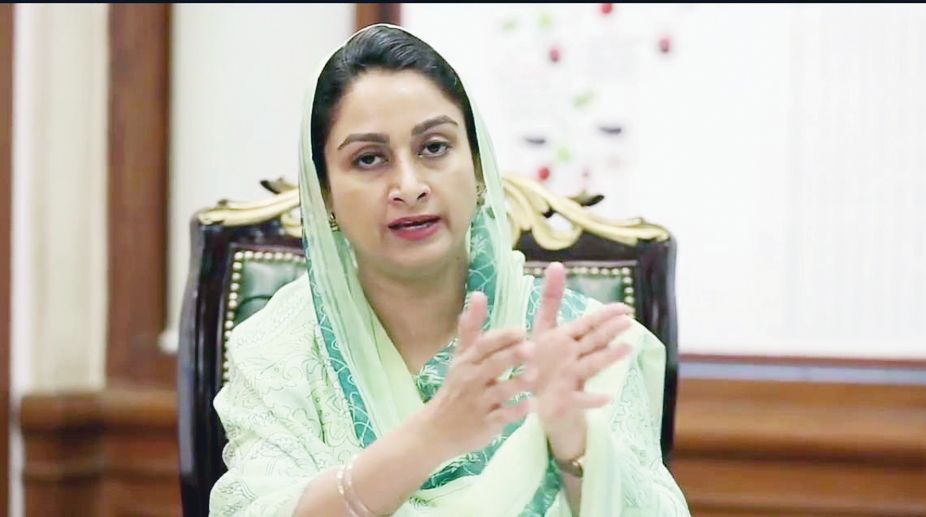Harsimrat Kaur Badal, member of an influential political family from Punjab, has given a new dimension to the Indian food processing industry by expediting the construction of mega food parks in the country to prevent unnecessary wastage of agriculture produce.
Primarily a textile designer, politics runs in her blood. She was born into a family that traces its roots to Attar Singh Majithia, a prominent general in Maharaja Ranjit Singh’s army. Her husband, Sukhbir Badal, was Deputy Chief Minister of Punjab.
Advertisement
She joined politics in 2009 when she contested and got elected from Bhatinda parliamentary constituency. She got re-elected in 2014 from the same constituency and was made Union Minister for Food Processing Industry.
She has also been active socially and in fighting for the cause of 1984 riot victims, girls’ education, and protection of trees. In an interview to VIJAY THAKUR, she spoke on the need to clean up the food processing industry in India and its progress in the past four years. Excerpts:
Q: The Prime Minister’s vision is to double farmers’ incomes by 2022. How do you think the food processing sector would help in fulfilling this dream?
A: Food processing is not only important to save farmers’ produce or to increase their income, it is much more than that. Look at the natural resources which go into producing farmers’ produce. Preserving and processing food means we are saving precious natural resources like water.
Just look at how much water we use to grow these crops which otherwise go waste due to want of proper preservation and processing. Imagine, to produce one kg of rice we require thousands of litres of water.
The money that goes waste is secondary, the main thing is we are wasting our precious natural resources. On the one hand food rots and on the other, a large number of people go without food.
Looking at all these things, this industry plays a pivotal role in reducing wastage, increasing availability and controlling inflation as well as ensuring nourishing and safe food to many hungry people in the country.
Q: India has great potential for food processing industry. According to a rough estimate nearly 30 per cent of the country’s fruit and vegetable harvest goes waste because of an inadequate food processing industry. What is the government doing to promote this sector?
A: We are one of the largest producers of food, largest producers of milk, and second largest producers of fruit, vegetables and meat. But we process only 10 per cent of what we produce. Smaller countries like Philippines and Malaysia process 70 to 80 per cent of their produce.
Although there is 33 per cent wastage across the globe, in developed countries the wastage is on the plate, but in our country the wastage is at the harvest, transportation and storage level. Western countries have managed to suppress wastage through modern technologies.
Now we also need to bring these modern technologies to India to stop wastage at harvest, transportation and storage level.
Over the past two to three years, we have worked to create an environment to promote food processing industries. As food processing increases, demand and infrastructure in this sector will increase automatically.
The first step we took was to create a corpus of Rs 2,000 crore with NABARD to give loans at cheaper rates for those building food processing infrastructure.
We brought down various excise duties and taxes to cut the end cost. In the second year, we allowed 100 per cent FDI in retail sector for food which is grown and manufactured in India. Directly and indirectly FDI boosted this sector.
In the first year there was an increase of 40 per cent foreign investment in the food processing industry, in the second year it was 60 per cent. Food processing is not like other industries, it is seasonal.
Unlike an industry which works round the year, this works only during the harvest. For the rest of the year, it has to be maintained. That’s why return on investment period is longer.
Q: We are expecting a 20 per cent growth in this sector and by 2024 this sector may attract nearly $33 billion investment. But little attention was paid to this sector in the past two decades. What do you think are the challenges that lie ahead?
A: To boost this sector, this year we have started Pradhan Mantri Kisan Sampada Yojana where nearly Rs 6,000 crore is allocated to create infrastructure in the food processing sector in the coming years. We have also simplified policies to assist in ease of doing business.
Our government has also speeded up building of mega food parks. The scheme was launched in 2008 aiming to build 42 mega food parks, but till 2014 only two mega food parks were operationalised.
When our government came into power, we monitored all the projects with an eagle eye. As a result, in the past four years, our government has operationalised 12 mega food parks.
This financial year we will operationalise another 10 food parks. My aim is that all the money which we sanctioned should not remain on paper, but should work on the ground.
Like the Rs 6,000 crore earmarked for PM Kisan Sampada Yojana would bring in another Rs 31,000 crore investment in the sector. It would further encourage farmers to become agro-producers.
Most importantly, a farmer would not be forced to sell his produce at a cheaper rate. He would have the choice to store it or process it if he is not getting better price for his produce.
We have also tried to help farmers to build their own backward and forward linkages. We have hired two reputed agencies to help farmers set up a cooperative, make their project report, apply to the ministry to receive 35 per cent subsidy to farmers or farmers organisations which are planning to set up their own food processing units. The agencies would also link them with the buyers, handhold them for two years, and make them stand on their own.
Q: With globalisation and increasing trade across the borders, India has great opportunities in exploring the global market. What steps is India taking to increase its presence in the international food processing market?
A: We have so much scope within India today. The retail sector is around $600 billion, out of which 70 per cent is food retail, and this would grow three-fold by 2020.
The demand for food in India is going to increase by 50 per cent in the next five years. So the market India has today is not available anywhere in the world which is why when we had World Food India in November 2017, more than 79 countries participated, over 60 CEOs of top companies attended it and 12 ministerial delegations joined the three-day event.
We signed MoUs worth $14 billion in just three days, which we thought we would sign in the next 10 years. Food importing nations like Japan and Middle East countries are now looking at India as a sourcing hub.
Middle East countries are importing 90 per cent of their food requirements. Besides all the Western countries who want to increase their footprints are looking at India as a food processing hub.
Q: What is the biggest challenge India’s food processing industry is facing?
A: The biggest challenge is to inform and educate farmers about the scheme. I am planning to launch a drive through All India Radio and Doordarshan.
Actually the states which are proactive are taking to these schemes and those states which are not very active are lagging behind. As a result the farmers of those states suffer.
Model food processing policies should be implemented throughout the country. The agro industry should get electricity at a cheaper rate like we get in the agriculture sector.
We are preserving agricultural produce and it should not be treated as an industry but as part of the agriculture sector and all facilities being given to that sector should be given to agro industry as well.











